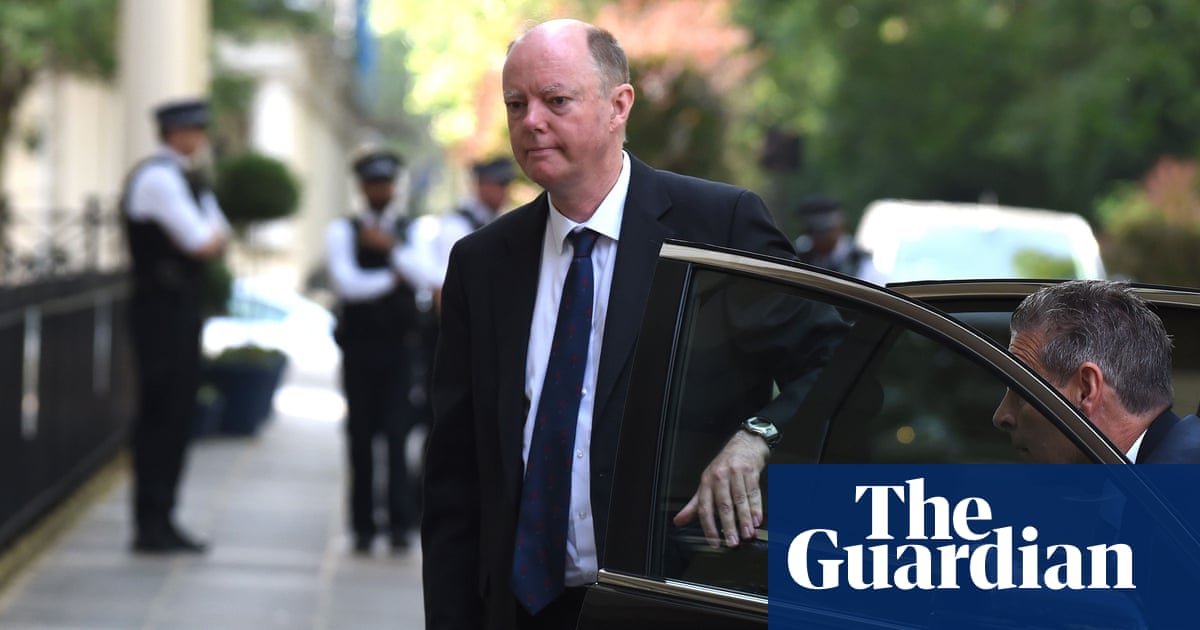
England’s chief medical officer, Sir Chris Whitty, said the UK “did not give sufficient thought” to stopping Covid in its tracks as he listed multiple problems with preparedness in his first cross-examination at the pandemic public inquiry.
Whitty said the “big weakness” was a lack of “radicalism” in thinking before the crisis took hold, and he said government scientific advisers would not have thought to have considered national lockdowns without it being requested by a senior politician.
He also warned of a weakness in future defences, noting the scientific advisory committee Nervtag, which looks at new respiratory viruses, does not cover other possible pandemic threats such as sexually transmitted diseases.
He spoke on the same day as Sir Patrick Vallance, the government’s chief scientific officer during the pandemic. Vallance, who stood down in March, called for more attention on the impact of pandemics on society’s most vulnerable people. He said it was a “terrible truth” and “tragedy” that “pandemics feed off inequality and drive inequality” and said while “we did pick up on it, [the knowledge] needs to be embedded right from day one”.
Whitty called for a national plan for a non-flu pandemic to go alongside the existing flu pandemic plan. He said there had been a failure in the way the UK planned for emergencies by trying to have “a plan for every eventuality ….[so] you can tick off all the things you got to do” rather than having the “building blocks of lots of different capabilities”.
He also warned that public abuse of and threats to scientists was “extremely concerning”.
In February 2021, video emerged of Whitty being abused in the street. Asked about the possibility of shortages of experts in the future he said it was essential to make clear “society very much appreciates the work of these people who put in enormous amounts of time, usually at no recompense”. Some universities were also becoming “more hawkish” about monitoring experts’ time off to help the nation, he said.
The inquiry chair, Lady Hallett, said to Whitty: “I was astonished and sorry to hear about the abuse of you and other colleagues. It’s wrong for so many reasons … There’s so many different ways to express different opinions. Why do we have to have personal abuse?”
Whitty, who stressed to the inquiry how he worked in Covid wards for 12 weeks, started his evidence by addressing the bereaved and said: “I can say to the families that are here that I saw the extraordinary devastation that it had on individuals and families.”
Asked about the effectiveness and breadth of thinking of the Scientific Advisory Group on Emergencies (Sage), he said during the time pressures of Covid there was “a reasonable balance between coherence and challenge”. But he supported the idea of “red teams” outside Sage providing more “challenge”.
It was the period between crises where Whitty said more radicalism was needed.
Taking lockdowns as an example, he said: “It would be very surprising, without this being requested by a senior politician or similar, that a scientific committee would venture in between emergencies into that kind of extraordinarily major social intervention with huge economic and social impact ramifications.”
Hugo Keith KC, counsel to the inquiry, said Matt Hancock, the former health secretary who will appear on Tuesday, had told the inquiry that because the government focused on the worst that could realistically happen insufficient thought was given to preventing the worst from happening at all.
Whitty said: “I half agree with the distinguished previous secretary of state.
after newsletter promotion
“I certainly agree that we did not give sufficient thought to what we could do to stop in its tracks a pandemic on the scale of Covid,” he said. “[But] it is sensible to have a plan for if everything fails, what are we going to do … if we could end up with 750,000 people dying.”
Earlier the inquiry heard from Roger Hargreaves, the director of the Cabinet Office briefing room unit, the government’s Cobra crisis management hub. He was previously director of the civil contingencies secretariat in the Cabinet Office, which covered longer-term planning as well as crisis response.
He said the crisis response system had been “pulled out of shape by terrorist incidents in 2017, by planning around Brexit, by Covid, by Afghanistan, by Russia, Ukraine”.
Covid was one example of the case “for having capabilities that are able to run an enduring response, not just a short-term response”. He said “poor performance in relation to international emergencies versus domestic emergencies” had caused a desire for “a more common purpose around crisis management inside the central government”.
He said: “I think one of the broad themes of this inquiry might well turn out to be whether government takes civil protection seriously enough in the round. In fact, not just government, but whether the UK does. … A statutory obligation is a very effective way to do that. It is not that I think that government departments don’t take this seriously. I just think there may be room to take it more seriously.”
The inquiry continues.
"type" - Google News
June 22, 2023 at 10:56PM
https://ift.tt/1sXPdZm
Chris Whitty: UK should have focused more on stopping Covid-type pandemic - The Guardian
"type" - Google News
https://ift.tt/kiRMPmx
https://ift.tt/PdrcVG6
Bagikan Berita Ini














0 Response to "Chris Whitty: UK should have focused more on stopping Covid-type pandemic - The Guardian"
Post a Comment